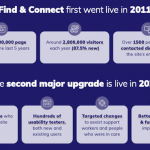Submission: Truth Telling for Stolen Children - Records and the Yoorrook Justice Commission
- Mar 15, 2024
- In Features
The Yoorrook Justice Commission, established in 2021, is the first formal truth-telling process into historical and ongoing injustices experienced by First Peoples in Victoria.
We have provided a submission to the Commission regarding records relating to Stolen Generations and other children who were removed from their family prior to 1990. Currently, there is no way of knowing what records were created and are still held by some charitable and religious institutions, and no guidance around culturally safe access to them.
Records access was highlighted in the Bringing Them Home Report, and before that the report into Aboriginal Deaths in Custody. Governments, and many organisations made significant improvements to their records access as a result of the Bringing Them Home recommendations. However, these organisations acted largely independently, without proper guidance or any compulsion to do so other than their own conscience. Many did nothing, and records have been lost due to poor storage, are not indexed or easy to find, and are not provided in ways that acknowledge the trauma they contain.
Knowledge of appropriate records access, and the importance of records has increased since Bringing Them Home – The Royal Commission into Child Sexual Abuse devoted an entire volume to the subject.
Find & Connect has called for a hearing to compel all care providers and record holders to provide evidence relating to the access and conditions of records about Aboriginal children in care, including private and religious organisations. This will determine which records have been kept, who has ownership of these records, where they are stored, and their access conditions.
We also ask that Yoorrook make recommendations around the preservation and access of records relating to First Peoples, including that appropriate storage and access requirements are made mandatory. This will provide for records to be kept securely, and not be hidden or destroyed either wilfully or by inappropriate storage, and that culturally safe records access processes will be mandated for First People seeking records.
In Victoria, Aboriginal children were placed in established homes already populated with non-Aboriginal children. They were not segregated into homes specifically for them, as happened in some other states. They may not have been recorded as Indigenous, which makes finding records relating to them, or even knowing which children were First Peoples far more difficult. Sometimes their Aboriginality may be noted in records that don’t otherwise relate to them – many records must be accessed to build a picture of their lives. A comprehensive guide to help them find the records relating to them is necessary to assist those removed from their family to find out all the information about their identity that exists.
These recommendations will provide a strong basis for First People who were removed to be able to access their records and discover their identity far more easily and safely than they currently can. They will also provide important testimony to the history of the Stolen Generations and child removal in Victoria, providing detail, context and factual information that is currently missing.






